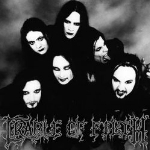 |
|
|||||||||
 |
 |
|
Genre Index Traditional NWOBHM Speed Thrash Death Grind Black Gothic Doom Industrial Melodic Power Progressive Neo-classical Symphonic Folk Epic Nu-metal -Core Others |
||
 |
|
||||
|
Folk Metal is simply Metal that incorporates anything local to any
particular band. These elements can include lyrics in the vernacular (the big word to the left means native language), cultural instruments
like bagpipes, national music, tavern drinking songs, or local folklore. Folk is a modifier rather than a true genre as it can be applied to
any kind of Metal, be it Death, Doom, Power, or Black. For example the band Finntroll merges Death Metal and Humppa (Finnish polka music). Base the lyrics of any form of Metal on Norse legends and one arrives at the Folk sub-genre Viking Metal. While one may tend to smirk or chuckle at such notions rest assured neither of these is for the faint of heart or tender eared.
Examples of Folk Metal artists: Finntroll, Elvenking, Cruachan, Skyclad, Vintersorg, Moonsorrow, Thyrfing, M go De Oz. |
|||||
 |

Epic |
||||
|
Epic Metal is defined by its subject matter rather than by any
particular playing style. Lyrically epic songs are often based on literature, opera, Broadway plays, and mythology. This is where all those
dragons, wizards, and elves that so often show up in Power Metal lyrics come from. The purpose is to tell the story musically; consequently,
Epic themes are often the focus for concept albums. For example Homer's "The Iliad" has been the basis for Manowar's "Triumph of Steel," the
tale of Atreus the basis for the two "The House of Atreus" albums by Virgin Steele, and Blind Guardian as often based concepts on the works
of Tolken. Some bands like Rhapsody write their own epics. Because Epic lyrics are often used in Power Metal many assume that they are
characteristic of that genre. However there are Epic Death Metal bands (Bal-Sagoth, Root), Epic Doom Metal bands (Candelmass), Epic Black
Metal bands (Bathory), and Epic Heavy Metal bands (Manilla Road). Most people outside of the Metal scene would be astonished at some of the voices to appear on Epic Metal songs. Christopher Lee has appeared to narrate on two Rhapsody releases, and sings a song thrice, each in a different language with the band on an EP. The late, great Orson Welles made appearances on two Manowar albums in the 1980's.
Examples of Epic Metal artists: Blind Guardian, Manilla Road, Rhapsody, Virgin Steele, Doomsword, Wintersun. |
|||||
 |

Nu-Metal |
||||
|
The question is not "To be, or not to be?" The question is "Is it
Metal, or not Metal?" Nu-metal is probably the most controversial subject in the Metal world; however, when compared and contrasted with
Metal differences rather than similarities are more likely to be found. In fact other than distorted guitars and vocals akin to Thrash in
their aggressiveness the two are actually very little alike. If the link on the first page was missed, the article contrasting the two is
here. Nu-metal, unlike any other form of Metal, did not develop from a previously established genre. Instead Nu-metal is most closely related to Grunge, and Grunge is the epitome of heavy anti-metal music. Both Nu-metal and Grunge ignore melody and complex instrumentation. They instead focus on mood, usually angst in Grunge, and anger in Nu-metal. One might recall from the first page of this guide that above all it is complexity- the applied principals of Classical Music- which differentiates Metal from other forms of hard music. Virtuosity is not required in Nu-metal as solos are completely absent. In fact in Nu-metal guitars are used to set a mood while it is the bass that takes the forefront. One of the highest forms of praise for a Nu-metal song would be, "Great baseline, Dude!" or "Killer base, man!" The guitar may actually completely disappear during verses in Nu-metal songs, only materializing during the chorus. Disappear! How Metal can any music be if the guitars are absent? Nu-metal is considered to be talentless lazy K-Mart music by many Metal fans. Mixed into the heavy alternative base Nu-metal also incorporates elements from Funk, Electronica, and most egregiously Hip Hop. Rap vocals are mixed in if not used exclusively, and DJ's diligently manipulate turntables. Ski caps, hooded sweatshirts, and baggy pants replace the denim and leather associated with Heavy Metal. Headbanging, raised fists, and "the horns" are exchanged for Gangsta Gestures. It has been suggested that Nu-metal was actually invented, produced, and promoted by recording industry executives. Grunge flourished in the late 1990's to the turn of the century as Alternative Music became mainstream due largely to a backlash against Glam Metal excess. As the Hair Metal bands quickly sank from sight their wake managed to pull most of the other genres down with them. This rapid evaporation of the metal scene left Metal fans once starving for new aggressive music as they had at the end of the 1970's. Many consider the rise of Nu-metal to be a profit driven effort to target that particular demographic, with hopes of generating some cross appeal in the Hip Hop crowd. Nu-Metal is currently in a state of decline, with many bands frantically attempting to distance themselves from the genre. Nevertheless, there have been several hugely successful bands and artists playing Nu-metal. Some breakout bands have even earned the grudging respect of a large body of Metal fans.
Examples Of Nu-Metal artists: Linkin Park, P.O.D., Kid Rock, Limp Bizkit, Mudvane, The Deftones, Korn. |
|||||
 |

Metalcore |
||||
|
Core (noun): a) The central or innermost part. b) The basic or most
important part; the essence. Either of these definitions would be appropriate to describe the character of -Core Metals. Basically the "core"
is Hardcore Punk, with elements of Metal wrapped around it. Thrashcore, Deathcore, Grindcore, and Metalcore are the common forms with the
last being the most prolific. The music uses metal influenced guitar riffing along with aggressive Thrash or Death Grunt styled vocals, but
the song structures retain the simplicity of Punk. Guitars are present but they are greatly down tuned, and the riffs are heavy but
uncomplicated. As in Nu-metal virtuosity is not a necessity, because solos are mostly absent. Drumming provides a heavy but simple beat. Metalcore has existed since the late 1980's, and was formerly called Crossover since that's technically what it is. Metalcore's popularity has been on the rise since the turn of the century, and it is poised to supplant Nu-metal as the dominant form of heavy music. Metalcore is incredibly heavy mosh-pit music; however, as with Nu-metal the debate rages about whether it should be considered a legitimate from of Metal, or dismissed as the latest fad music for "Mallcore" kids. There is an exception to the "-core" rule that should be mentioned. Rapcore is a mixture of Rap and Nu-metal, not Rap and Hardcore. Rapcore only differs from other Nu-metal in that Rap vocals are used to a greater extent or exclusively.
Examples of Metalcore artists: Avenged Sevenfold, Killswitch Engage, Biohazard, Stuck Mojo, Hatebreed, Pro-Pain. |
|||||
| Others: There are countless other genre modifiers, most of which are related to content and are self-explanatory. Fantasy metal, Oriental Metal, and Medieval Metal should be easy enough to decipher. Dark Metal is sort of an over-genre, which includes Gothic, Doom, and Ambience Metal. Baroque Metal is a specialized Symphonic Metal. Cosmic... space and sci-fi themes. Christian.... The mastermind behind Rhapsody, Luca Turilli, has dubbed his work "Hollywood Sound Score Metal." In addition to all the little subsets genres can be combined in almost any combination. Progressive Death, Progressive Power, Epic Doom, Death/Black, Industrial Gothic, and Symphonic Folk Metal to name but a few.
Although the sub-genre list keeps growing few are actually more
than specialized forms of already existing genres, while the rest tend to be content specific or combinations of others. Being familiar with
the genres listed in this guide should be more than sufficient to navigate the field. Now you should know what to expect when someone tells
you that Cradle of Filth is a Symphonic Black Metal Band... right? |
|||||

Genre Index Traditional NWOBHM Speed Thrash Death Grind Black Gothic Doom Industrial Melodic Power Progressive Neo-classical Symphonic Folk Epic Nu-metal -Core Others |
||
 |
 |
|


